The priest-theologian David Tracy once wrote of the “three publics” to whom every teacher of theology speaks: the academy, the church and society at large. These are markedly different audiences; what can appear to one audience as wonkish or an argument about how many angels can dance on the head of a pin can be of pressing concern to another. Ultimately, any theological proposition becomes matter for reflection and action for all three audiences, a process ongoing in the church and the world since Peter argued with Paul over who, exactly, was coming to dinner.
If we apply Tracy’s matrix to the papacy, Pope Francis’ first year has been a revelation: he is winning over two of these audiences with ease. “It’s official,” a CNN reporter wrote in November, “Pope Francis is the most talked-about person on the planet.” Time named him the person of the year; he is on the cover of Rolling Stone. This can be jarring for anyone who recalls the puzzlement or open hostility much of the public showed toward his predecessor. I remember the rancorous way my graduate school classmates reacted to Pope Benedict; and, frankly, I feel a bit cheated. Can I get back all that time I spent arguing? Pope Francis, however, is a worldwide rockstar.
The second audience—the church—has also reacted with joy, in part because Francis is so obviously simpatico with the gritty day-to-day religious realities in which most of us live our lives. Gone (or submerged) in most circles is the notion of a “smaller, purer church,” replaced in an astonishing year by conversations like “maybe I’ll come back” or “did you see what Francis did?” The “Francis effect” may be a passing phenomenon, but it is a real one. And Deo gratias for that, to see a church of joy and excitement.
But what of the third audience, the academy? Professors, teachers, men and women religious, writers and all the other folks whose religion is also their profession? Here the reality becomes more complicated, because during the past two papacies, this audience was more often than not the recipient of negative news from Rome, in the form of a “notification” from the Congregation for the Doctrine of the Faith, a censure, a silencing, an investigation. The same was found on a smaller scale with the U.S. bishops’ Committee on Doctrine. It is worth noting that two recent cause célèbres—the investigation of the Leadership Conference of Women Religious and the notification concerning Elizabeth A. Johnson, C.S.J.—are only the visible part of the iceberg. Many more cases never became public.
Might we hope that the Francis era will also bring a rapprochement between the academy and the doctrinal stewards of the institutional church? Francis has certainly opened the door to this, not least by his startling criticism of the “self-absorbed promethean neo-Pelagianism” of those who “feel superior to others because they observe certain rules or remain intransigently faithful to a particular Catholic style from the past,” whose “supposed soundness of doctrine or discipline leads instead to a narcissistic and authoritarian elitism....” Note that these are not off-the-cuff comments by the pope. They are direct quotations from his apostolic exhortation, “Evangelii Gaudium.”
Even incremental changes would do much to help the academy experience the same jolt of energy Francis has given the rest of the church. Can we eliminate secret processes where scholars find out the same day as the press that they are under censure? Might we hope for transparent procedures at the C.D.F. instead of closed tribunals, an openness to theological explorations that reflect a 21st-century faith instead of a defensive crouch around the definitions of fourth-century church councils? What if distinctions were made between propositions that might “cause confusion” and those that actually deny central dogmas of the faith? And wouldn’t it be wise to include lay persons and women religious in evaluations of groups like the L.C.W.R.?
Actions like these would do much to encourage those in the academy to seek with confidence what Francis himself has encouraged: “Open the doors, do something there where life calls for it. I would rather have a church that makes mistakes for doing something than one that gets sick from being closed up.”








